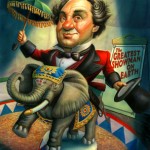 I touched the other day on the fact that Rick Santorum had included Opus Dei in the list of organizations he chose to praise for the “new evangelization” (he also included Regnum Christi, a group of which I had never previously heard, of which I’ll write something in a later post), and I drew some criticism from one reader from saying that Opus Dei rang a “somewhat sinister” bell. His suspicion, quite clearly, was that I had been influenced by Dan Brown’s distinctly dodgy narratives. Nothing could be further from the truth.
I touched the other day on the fact that Rick Santorum had included Opus Dei in the list of organizations he chose to praise for the “new evangelization” (he also included Regnum Christi, a group of which I had never previously heard, of which I’ll write something in a later post), and I drew some criticism from one reader from saying that Opus Dei rang a “somewhat sinister” bell. His suspicion, quite clearly, was that I had been influenced by Dan Brown’s distinctly dodgy narratives. Nothing could be further from the truth.
Opus Dei certainly has some fine people in its ranks, but, as this recent post from the Daily Telegraph’s Damian Thompson (a former editor of the Catholic Herald) demonstrates, there is something about this organization that does not feel, well, quite right:
With all this phone hacking around, I think it’s time electronic eavesdroppers had their own patron saint, don’t you? As it happens, I have the perfect candidate: St Josemaria Escrivá, founder of Opus Dei, who died as recently as 1975 and was canonised by Pope John Paul II in 2002.
A few years ago, I interviewed a distinguished priest who, as a young man, had been a member of Opus Dei and close associate of Escrivá. My jaw dropped when, half way through our conversation, he mentioned casually that “The Father” had installed bugs in Opus’s Rome headquarters in order to tape-record the conversations of visitors waiting to see him. I asked him how he knew.
“Because I helped him do it,” came the reply.
The Vatican refused to hear this priest’s testimony when Escrivá was being assessed for sainthood; conveniently, the role of Devil’s Advocate had been abolished. Of course, all saints had flaws. It’s just that you don’t expect them to share the same ones as Richard Nixon (a far more sympathetic character than Escrivá, in my book).
Anyway, the reason I’m bringing up Opus Dei is that this controversial organisation – comically misrepresented in The Da Vinci Code but still secretive and slippery – is planning to open two independent secondary schools in south-east England.
Or, to adopt the official party line, a group of parents, some of whom happen to belong to Opus Dei, are opening schools “inspired by the teachings” of St Josemaria. Hmm. Don’t get me wrong, Escrivá was undoubtedly holy, but he was also vain, a snob and a spiritual control freak. While some of his followers are exemplary Christians, the saturnine ethos of Opus bothers many Catholics, including some outstanding clergy.
A priest I know used to hear the confessions of primary school children at an Opus Dei school. “It was disturbing,” he told me. “I’d hear seven-year-olds riddled with adult scruples, worried that their disposition towards the sacrament wasn’t sufficiently pure and their sin wouldn’t be forgiven.”
He added that a teacher at an Opus school had boasted to him that she’d persuaded a little boy to give up his teddy bear for Lent. “How on earth is that going to help the child – to take away something so comforting and normal as part of his so-called spiritual development?”
Indeed. And one might also ask: how are Opus Dei “numeraries” (full members) supposed to develop healthy relationships with the opposite sex when men and women are forbidden to travel in the same car? Even if the man is a priest? One Opus centre has installed two sets of sliding doors between the kitchen and the dining room. This allows serving women to leave food in the small space between the rooms so male diners aren’t “distracted” by female flesh.
Opus Dei in England has taken advantage of the bumbling of the Catholic bishops. (Think L/Cpl Jones in a mitre.) Its fingerprints are all over a new PR outfit called “Catholic Voices”, it has a growing presence in a certain seminary, and before the papal visit it even managed to appoint a thickly accented Spaniard as spokesman for the beatification of John Henry Newman.
Opus always hits back when it’s criticised, so no doubt there will be the usual carefully worded and disingenuous denial of everything I’ve just told you. Meanwhile, its recruiters will keep gatecrashing smart Catholic parties, scanning the crowd for attractive young professionals who can be invited to “informal” drinks and then plugged into E-meters. No, sorry, that’s the Scientologists. But it’s an easy mistake to make.
And Rick Santorum’s support for Opus Dei is more than a matter than one line in a problematic article. If, for example, we turn to a 2002 report from the National Catholic Reporter we find this:
The extent of the power and prestige of Opus Dei in today’s Catholic church was on full display during a high profile Jan. 7-11 congress here marking the 100th anniversary of the birth of founder Josemaria Escriva de Balaguer.
The event drew 1,200 people from 57 countries, with an impressive number of church and state VIPs on hand, and was streamed live on the Internet. It occurred less than a month after Pope John Paul II recognized a miracle that clears the way for Escriva to become a saint.
One point that became clear during the Congress was how Opus Dei-inspired politicians tend to apply Escriva’s emphasis on finding holiness in work. A key theme of the gathering was the need for “coherence” between faith and politics, which in practical terms means taking one’s cues from the Catholic church on issues such as abortion, gay marriage and cloning.
American VIPs included Archbishop John Myers of Newark, N.J., a member of Opus Dei’s Priestly Society of the Holy Cross, and U.S. Senator Rick Santorum, Republican of Pennsylvania. Santorum told NCR he is not a member of Opus Dei, but an admirer of Escriva…
Santorum is, of course, fully entitled to those views, but the electorate is fully entitled to ask how they would affect his behavior as president. Writing in the 2007 article I cited in a previous post, Santorum argued as follows:
[Romney] also said that “a person should not be rejected . . . because of his faith.” His supporters say it is akin to rejecting Barack Obama because he is black. But Obama was born black; Romney is a Mormon because he accepts the beliefs of the Mormon faith. This permits us, therefore, to make inferences about his judgment and character, good or bad.
Fair enough, and the same can be said about Santorum’s admiration for Opus Dei.
 In the in-tray today an apocalyptic, adjective-crammed appeal to support the Gingrich campaign. It began as follows:
In the in-tray today an apocalyptic, adjective-crammed appeal to support the Gingrich campaign. It began as follows: 







